| 6 | The Camillo Story |
The Camillos of the Veneto
The earliest documented traces of the Camillos in the
Veneto, go back to 1480 with the birth of a certain Giulio Camillo in Friuli. He was presumably born in the Castle of
Zoppola, four miles from San Vito di Tagliamento, between Pordenone and
Portogruaro.
He was nicknamed “Delminio”, possibly in relation to
a Dalmation town Delminium, in present Croatia, from whence his father may
have come.
Giulio studied humanities in Venice and Padova,
specialising in philosophy and developed his own complex theories. He
aspired to produce a unified theory of all knowledge, grouped in a
universal encyclopaedia of science. He dedicated all his life to obtaining
this perfection, which was to remain uncompleted.
He had many illustrious followers, who regarded him as a genius,
but also many enemies, jealous of his successes at court, who denigrated
his work. Certainly he was quite an extravagant fellow and his ideas
appear brilliant, but are very difficult to follow and the truth probably
lies somewhere in the middle.
He had constructed a portable wooden stage, from which he
professed his claims, on his many tours around the country, obtaining
ferocious derision as well as unconditioned praise. In 1530 he left for
France and was received by King Francis I, who was so well impressed with
Giulio Camillo, that he kept
him at his service as his personal tutor.
See "Giulio
Camillo e il Teatro della Memoria"
See also "Anima Artificiale" "L'idea del Teatro e altri scritti"
Giulio Camillo Delmino was one of the most famous thinker in the sixteenth century
His fame and respect in France was greatly enhanced by
the episode of an escaped lion: while in the company of several notables,
including a cardinal, a lion suddenly appeared and in the general
helter-skelter, Giulio was left alone with the lion, not because of any
particular courage, but because his portly stature impeded him from moving
quickly. To everybody’s amazement, the lion brushed against Giulio like
a cat wanting to be petted. This happening was cunningly used to symbolise
the submission of nature before the intellect of man.
Camillo wrote many treatises, travelled widely and
discoursed with the intelligentsia of the times throughout Europe,
including popes, future saints and even Calvin in Geneva. He died in Milan
on May 15th 1544. This enigmatic personality earned fully eleven pages in
Italy’s Who’s Who.
Thereafter there were no other Camillos of fame and we arrive at the present generation of Camillos living in Nervesa della Battaglia. In 1750 a certain Giovanni Camillo, married Domenica Stival, presumably from Conegliano, where many descendants still bear that name today.


Anna Durigan and Agostino Camillo
Maria-Giovanna Visentin and Giuseppe Trinca
He fathered Paolo, who grew
up as a farmer and married Veneranda Gobbo and had a son whom he named
Giovanni, after his grandfather. This Giovanni's wife, Dorotea Gobbo, died
while giving birth to Angela and from his second wife, Giustina Piccolo,
Giovanni had five more children, Teresa, Candida, Guerino, Domenico and
Agostino Pasquale. The progeny wandered as far away as Australia and the
USA.
This last son, Agostino Pasquale, had eight children from
his wife Anna Durigan, one being the recent patriarch, Celeste
Camillo. Their other
children were Augusta Teresa, Giustina, Regina, Marta, Assunta Amalia and
Isidoro.
Celeste Camillo was born in Arcade, a hamlet of Nervesa,
on the 18th of August 1900. His family soon moved to nearby Bavaria and
Sovilla, before settling in Nervesa itself. He married Maria Ester Trinca
in 1921 and fathered ten children, Dino, Armando, Emerenziana, Tarcisio,
Maria, Bertilla, Luigi, Giovanni, Luciana and Anna. The second-born female
child, Emerenziana, died tragically at only 2 years, drowning near her
home.
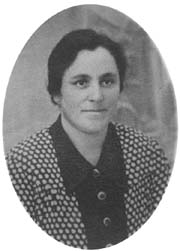
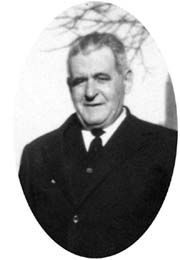
Ester
Trinca
Celeste Camillo
In 1939 at the first signs of impending trouble, Celeste
Camillo, fully aware of what a new war would entail for his firstborn son,
Dino, hastily sent him off to a far away country. The first choice was
Argentina, but he later settled for Australia, where he had a brother in
law, Goegan, whose wife was the sister of Ester.
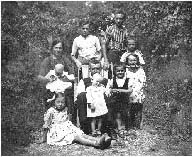 Celeste Camillo' s family - Click to enlarge
Celeste Camillo' s family - Click to enlarge
Celeste worked as a clerk in the local town council, the Commune and was a learned and respected man. After his wife died prematurely at 50 years in 1952, he remarried Teresa Rossato, who lived by his side until his own death in 1964.
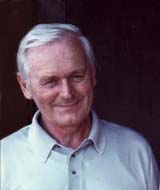
Armando Camillo became a missionary priest in the Consolata Order and worked in Kenya, recently celebrating his 50th anniversary in the priesthood.
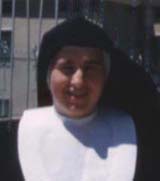 Click for more photos of
Luciana
Click for more photos of
Luciana
Luciana joined an order of nuns (the Figlie di Maria
Ausigliatrice - Salesians of Don Bosco) and remained in the Veneto
teaching children, whereas Anna married and remained in Nervesa.
<<< BACK
Return to Menu of Camillo Story
l-camillo.com
Copyright L. Camillo 2005
